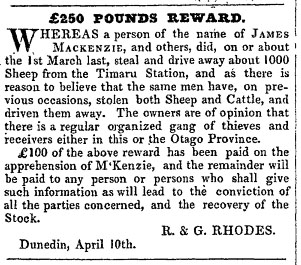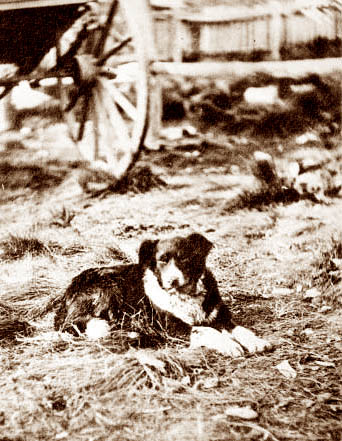Mr. L. Langlands, in a letter dated Highfield, Burke's Pass, and published in the "Otago Witness": some years before 1903, says
|
"On
several occasions sheep in large numbers were missed from The Levels
station. Mr. Rhodes came to Dunedin in the hope of hearing something
about them. He told me he felt convinced they were brought into Otago,
but no traces were left, was at a loss to conceive how, and had to return
no wiser than when he came.
In those days the common custom was for sheep to be tended in large flocks by boundary keepers, generally two men in a hut. On the Levels some Maoris were acting in that capacity, and report had it that they were more partial to playing cards in each other's huts than looking after the sheep. Each flock had a large block to graze over, and they were only mustered on special occasions, sheepstealing was thus made easy. There country was all open, and if a mob could be got away without being seen going. some time might elapse before they were missed.
He was told to go again next day, with the consolation that if he came back without them he would get a flogging. This frightened the boy, and caused him to cover a lot of ground, but without success, Sidebottom, still doubting, questioned him closely as to where he had been and what he had seen. Amongst other things the boy said he had seen a man with a bullock driving sheep. Being beyond bounds, Sidebottom knew it was none of the station hands, and it at once struck him that probably here was a clue to the mystery. Early next morning, taking the boy and two Maoris, he started in pursuit, and about dinner-time came on a man, the pack bullock grazing near him, the sheep in front, and the dog lying near them. Mackenzie knew very little English, but he had mastered enough to ask Sidebottom "Who seep dat?' Sidebottom told him he knew perfectly well whose sheep they were, and after a scuffle Sidebottom threw and held him down, and he was speedily secured with ropes, taken back to Timaru, and given into custody. This led to the discovery of the Mackenzie Country, and eventually also the Mackenzie Pass, for Sidebottom, being curious to know what outlet he had in that direction, returned to where he had picked Mackenzie up, and travelling in the direction he had been going when made the discovery. These particulars I had from Mr. Sidebottom himself. Mackenzie was convicted and sentenced for sheep-stealing and confined to the Lyttelton Goal. On the occasion of Governor Browne' first visit to Christchurch he was the only prisoner in the goal. I believe it is the custom on an occasion of that kind, if the crime is not too serious, to commemorate it by an act of clemency. Whether or no, he was pardoned on condition of taking his undoubted though misapplied talents to other shores, and was taken by the goal authorities on board a vessel bound for Australia, and nothing reliable was heard of him afterwards. I think there is little doubt of his taken several mobs through the pass and crossed the Waitaki at what is known as Ross's Crossing - a crossing made to order, and where one man would have little trouble with thousands, but his route through Otago is unknown. I saw his dog in Christchurch when in possession of Inspector Pender (who kept it for a time and gave it to a runholder) - a low-set black slut, with tanned muzzle and feet. Of course he was accustomed to be worked in Gaelic, and several tried her on sheep in that language;  but whether their Gaelic smacked too much of the tussock and not sufficiently
of the heather for her taste, or whether the work was too honest, I
can't say, but she would work for no one.
but whether their Gaelic smacked too much of the tussock and not sufficiently
of the heather for her taste, or whether the work was too honest, I
can't say, but she would work for no one. The bullock did not belong to Mackenzie. Its owner was well known in Otago, he having a place on the Taieri and a run down south, where no doubt the sheep were going as other had gone before them. In Scotland he had been a cattle and sheep dealer on a very large scale, and had unlimited credit. One fine day his clothes, from his hat to his boots, including also a bulky pocket book, were found beside a stream, which was dragged, but the body was not recovered probably because they did not try the right place. Had they thrown the grapnel in Princes Street, Dunedin, they might have been more successful, as that is where he serenely bobbed up, very wealthily, after that memorable dive, having divested himself of his name and heavy liabilities as well as his clothes in the process. With the exception of a note or two for appearance sake, the papers in the pocket book were valueless." |
|
McKenzie's Ghost, by Kath Tait, 1973
The Old Mackenzie Trail, by Bob Edwards, 1950s
McKenzie and his Dog, Traditional
Article in "Canterbury, Old and New" by Mr. E.W. Seager, Inspector of Police, 1900
|
